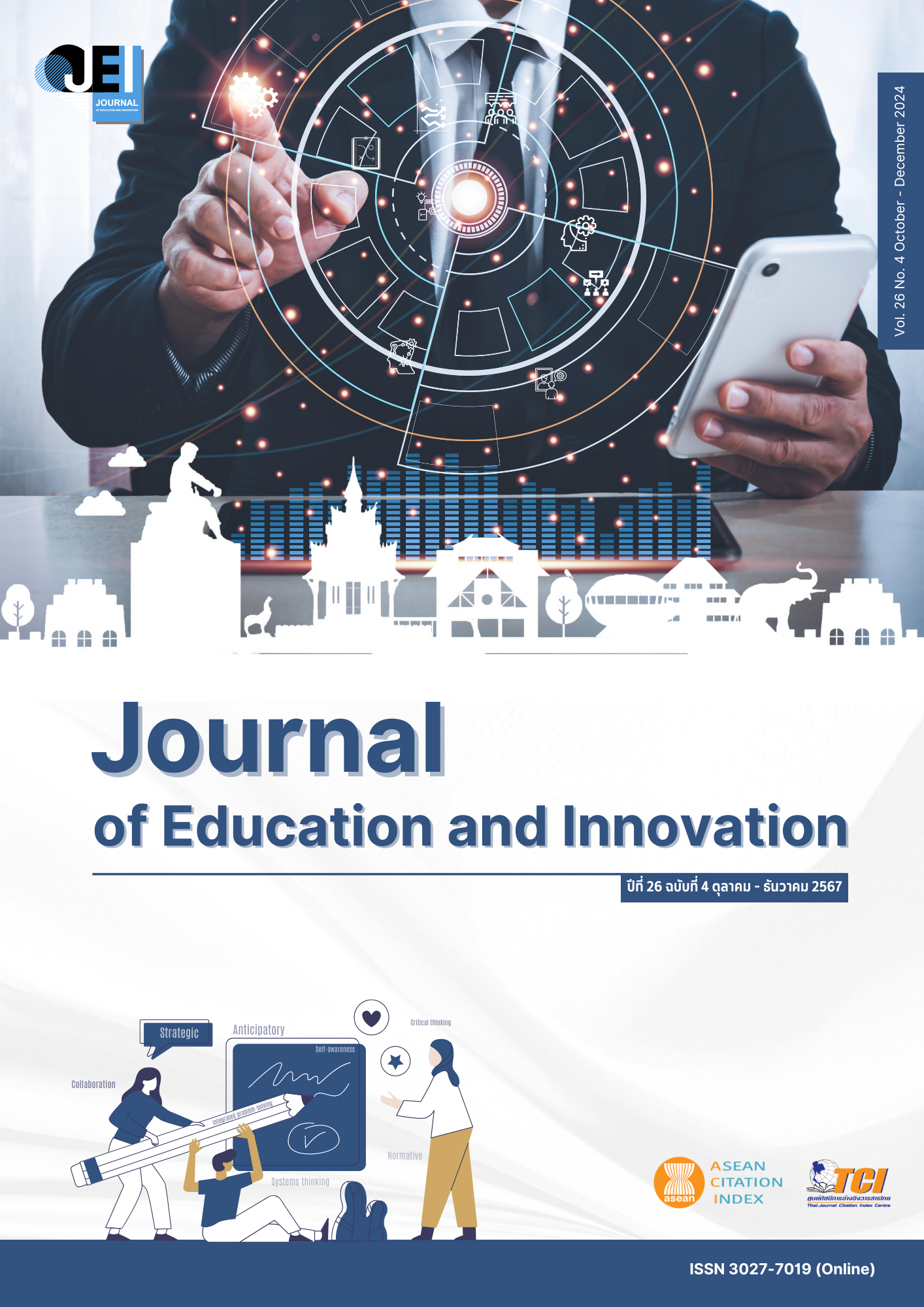CREATING A TRAINING MANUAL ON THAI WISDOM FOR MAKING THONG YIP SWEETS IN THE GROUP OF CENTRAL PROVINCES
Main Article Content
Abstract
This research aims to 1) create a training manual on Thai wisdom for the production of Thong Yip sweets (pinched gold egg yolks) in the central provinces, and 2) and compare (pre-posttests) the knowledge before and after the use of the training manual on Thai wisdom for the production of Thong Yip sweets in
the central provinces, and 3) examine the satisfaction with the training manual on Thai wisdom for
the production of Thong Yip sweets in the central provinces, who voluntarily participated in the training.
The research instruments used in the study included the training manual, knowledge tests (pre-posttests), and a satisfaction questionnaire, which passed quality checks according to the criteria standard. The statistics used for data analysis included percentage, mean, standard deviation, t-test, and content analysis. The results showed that: firstly, the training manual on Thai wisdom for producing Thong Yip sweets in the central provinces had an effectiveness index (E.I.) at 0.70 level, indicating that the participants' knowledge increased 70.27%. Secondly, the participants’ knowledge scores after the training were significantly higher than those of before the training at .05 level of statistical significance. Thirdly, the participants' satisfaction with the training manual was at the highest level ( = 4.75, SD = 0.29). Therefore, the training manual was an effective medium that enabled participants to make Thong Yip sweets independently, resulting in the complete Thong Yip production, consistent with the desired characteristics of Thong Yip sweets. According to the characteristics of Thong Yip sweets, Thai wisdom in the central provinces.
Article Details

This work is licensed under a Creative Commons Attribution-NonCommercial-NoDerivatives 4.0 International License.
The owner of the article does not copy or violate any of its copyright. If any copyright infringement occurs or prosecution, in any case, the Editorial Board is not involved in all the rights to the owner of the article to be performed.
References
Anupong, P., Chayapat, K., & Nomjit, S. (2023). The development of multimedia teaching material for floral embroidery broches pined in lady’s clothes for Nakhon Laung Polytechnic College Students. Journal of Technical Education Development, 35(125), 51-61.
Bloom, B. (1956). Taxonomy of educational objectives, handbook I: The cognitive domain. New York: David McKay.
Chawala, L., & Thipsukon, T. (2015). Thai antiquity food and sweets culture of Klong Kanom-wan Village, Pakkred District, Nontaburi Province. VRU Research and Development Journal Science and Technology, 10(1), 142-155.
Chirawan, S., & Korapin, K. (2024). Career potential development based on local wisdom of the elderly: A case study of Khanom Kong Group, Ban Hua Phai, Hua Phai Subdistrict, Mueang Sing Buri District Sing Buri Province. The Journal of Research and Academics, 7(1), 263-278.
Jintana, S. (2004). Education and community development. Chiang Mai: Department of Educational Promotion Faculty of Education Chiang Mai University.
Jiraphat, K. (2020). Professional skills training manual development for elderly people by community participation process, Phitsanulok. Journal of Community Development and Life Quality, 8(1), 31-41.
Luxana, K. (2018). Knowledge management models for local wisdom and culture: A case study of Pak Phli District Nakhon Nayok Province. VRU Research and Development Journal Science and Technology, 13(2), 75-85.
Institute for Innovative Foresight National Innovation Agency (Public Organization). (2024). The future of learning. Retrieved from https://www.ifi.nia.or.th
Office of the National Economic and Social Development Council. (2017). National strategy for 20 years. Bangkok: Office of the Secretariat of the National Strategy Committee.
Office of the Public Sector Development Commission. (2009). Preparation of work manual (2nd ed.). Bangkok: Cabinet and Royal Gazette.
Panich, W. (2012). Creating learning for student in 21st century. Bangkok: Sodsri-Saritwong Foundation.
Pannee, L. (2016). Educational research methods (11th ed.). Bangkok: Min Service Support.
Prapaporn, S. (2022). Development of food model and food exchange e-san prototypes for diabetic. Journal of Research and Health Innovative Development, 3(1), 9-23.
Preecha, C. (2007). Techniques for writing and producing textbooks (4th ed.). Bangkok: Chulalongkorn University.
Sonthaya, Y., Thippawan, K., & Bunyanuch, C. (2018). A development of a training curriculum entitled, “Creating Products from Lotus Flowers,” for Lower Secondary Students, Suphanburi College of Dramatic Arts. Journal of Lawasri, 2(1), 78-91.
Tanavit, L. (2023). Thai desserts: Evolution and application for health. Journal of Cultural Approach, 23(44), 70-84.
Tanawat, R. (2020). The study of satisfaction with field experience manual of bachelor of arts program in students of the school of tourism and hospitality management. Research and Development Journal Suan Sunandha Rajabhat University, 12(1), 1-12.
Watanaporn, C., & Hongvarin, C. (2021). Development of Thai desserts short course packages to elevate the grass root economy of the collaborative farming in Nakhonchaiburin. NRRU Community Research Journal, 15(2), 82-93.


